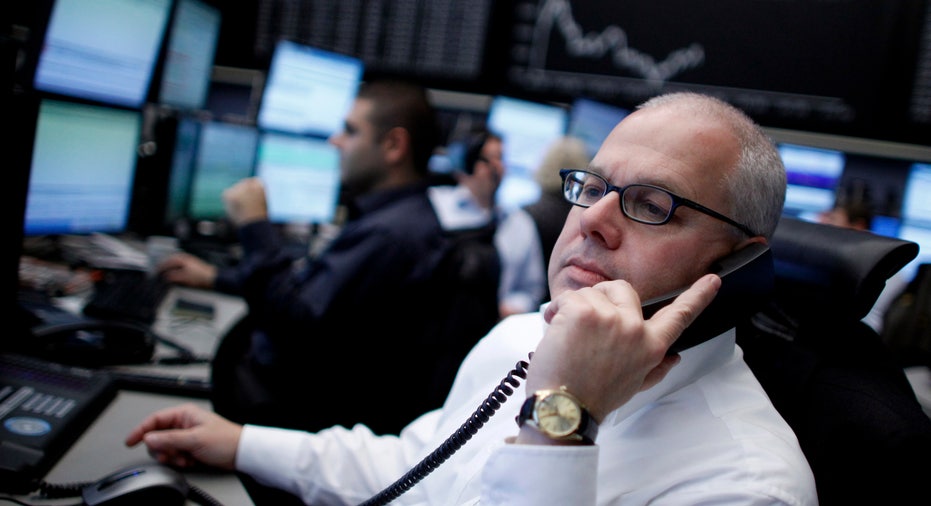European Markets Extend Fed-Fueled Rally

European shares rallied on Thursday after the U.S. Federal Reserve sugar-coated its decision to start winding down its crisis-era stimulus with a promise to keep interest rates at record low levels even longer than previously signalled.
Investors had been agonising for months over when the Fed would start reducing its bond buying programme. But in the end they took its $10 billion reduction in monthly stimulus in their stride, seeing it as a modest step the U.S. economy could well withstand.
After Wall Street ended at a record high and Tokyo and some other parts of Asia posted big gains, European stocks raced up 1.5 percent in their biggest jump in over two months.
The dollar was the other major beneficiary, though it was showing signs of fatigue as Europe headed towards midday.
Having surged as far as 104.37 yen overnight it was back at 104, while the euro had regained its footing again having toppled back to $1.3675 from a $1.3811 top.
The Fed softened the blow of reducing its stimulus by making its forward guidance on interest rates even more dovish.
"It likely will be appropriate to maintain the current target range for the federal funds rate well past the time that the unemployment rate declines below 6-1/2 percent, especially if projected inflation continues to run below the committee's 2 percent longer-run goal," the Fed statement said.
Samy Chaar, senior investment strategist at Lombard Odier's private banking division noted the Fed's forecasts for the funds rate had also been trimmed out to the end of 2016.
"It's a dovish taper and for now it's the perfect deal," Chaar said. "The equity market has appreciated the move but what is also important is that the bond market has not reacted negatively."
The market seemed to agree, with futures prices pointing to only very minor profit taking on Wall Street when trading resumes. The Dow ended Wednesday up 1.84 percent, the S&P 500 gained 1.66 percent and the Nasdaq 1.15 percent.
In Asia, stocks leapt from Sydney to Seoul. The slide in the yen was viewed as positive for Japanese exports and profits, and thus for the Nikkei which climbed 1.7 percent to its highest in six years.
Shanghai was one of the few the break ranks with a drop of 0.6 percent after China's central bank declined to add liquidity to the banking system, pushing up money market rates.
BONDS KEEP CALM AND CARRY ON
The Fed move follows last week's smoother-than-expected U.S. budget agreement which should ensure there is no repeat of this year's unsettling government shutdown.
The Fed's message that tapering was not tightening looked to have resonated in debt markets as Fed fund futures held broadly steady out to the early 2016 contracts. A first hike in the funds rate is not fully priced in until November 2015.
Treasury yields inched up, and though there was some minor flattening of the curve as the short-end nosed higher, the main 10-year note remained well below this year's 3 percent peak at 2.88 percent.
European debt markets barely blinked. Benchmark German borrowing costs drifted sideways, while there was little reaction elsewhere in the region.
Still, tapering could be a double-edged sword for some countries since it could accelerate the "great rotation" of funds out of emerging markets and into developed world assets.
Indonesia, the Philippines, Thailand and Malaysia have all been hit to a varying extent in recent months.
The Indonesian rupiah hit a fresh five-year low, though the Fed's move was welcomed by Deputy Governor of Bank Indonesia, Perry Warjiyo.
"The announcement provides more clarity for the direction of Fed monetary policy," Warjiyo told Reuters.
Others are also better prepared for the change. Notably the mood around India has improved enough that its central bank held off on hiking interest rates on Wednesday, surprising many.
Commodity markets showed some trepidation. Gold slumped over $20 to a six-month low of $1,203 an ounce and uncomfortably close to the year low at $1,180.74. Copper fell the most in nearly three weeks to be down 0.8 percent.
Oil prices took only a small hit, with investors perhaps encouraged by signs of a pick-up in global growth.
Brent crude eased 5 cents at $109.57 a barrel. U.S. oil futures were steady at $97.84 a barrel and still up over a dollar on the week so far.



















